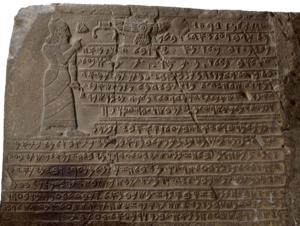L’idéologie royale au Levant ancien : influences et identités
Environnement, Territoires, Circulations
Doctorat préparé par David Ibrahim Drougard, sous la direction de Gaëlle Tallet et Isabelle Klock-Fontanille
 La présente thèse traite de l’idéologie royale des Etats nouvellement constitués sur la côte syro-palestinienne à partir du XIe siècle av. J.-C. Le corpus des inscriptions royales ouest-sémitiques, qui compte une vingtaine d’inscriptions de provenances diverses (royaumes araméens, phéniciens, moabite…), permet d’étudier ce thème à l’échelle de l’ensemble du Levant.
La présente thèse traite de l’idéologie royale des Etats nouvellement constitués sur la côte syro-palestinienne à partir du XIe siècle av. J.-C. Le corpus des inscriptions royales ouest-sémitiques, qui compte une vingtaine d’inscriptions de provenances diverses (royaumes araméens, phéniciens, moabite…), permet d’étudier ce thème à l’échelle de l’ensemble du Levant.
Cette région fut un carrefour culturel, situé à l’intersection de trois grandes aires civilisationnelles (Egypte, Anatolie et Mésopotamie). Il s’agit donc d’évaluer l’influence qu’ont pu avoir les idéologies royales existantes dans ces dernières sur celle(s) des royaumes ouest-sémitiques, en prenant notamment en compte les découvertes épigraphiques récentes faites en Syrie du Nord, qui amènent à repenser de manière plus complexe les interactions culturelles au sein du Proche-Orient ancien.
La vraisemblable pluralité des influences invite naturellement à examiner la question des identités propres de ces royaumes levantins sur le temps long, entre les XIe et IVe siècles av. J.-C.
Royal ideology in ancient Levant : influences and identities
The purpose of the present thesis is to focus on royal ideology of the newly born states of the syro-palestinian coast from the XIth century B.C. The corpus of west-semitic royal inscriptions, which numbers around twenty inscriptions from various sources (among others, Arameans, Phenicians, and Moabite kingdoms), makes it possible to study this topic at the scale of the whole Levant.
This region was a cultural meeting point, located at the crossroads of three important civilizational areas (Egypt, Anatolia and Mesopotamia). It is therefore relevant to examine the impact of royal ideologies existing in these areas on the one(s) of the west-semitic kingdoms, taking into account the recent epigraphical discoveries made in North Syria, which lead to reconsider the cultural interactions inside the ancient Near East in a more complex way.
The most likely plurality of influences naturally invites to explore as well the matter of these kingdoms’ specific identities over the period XIth- IVth centuries B.C.
